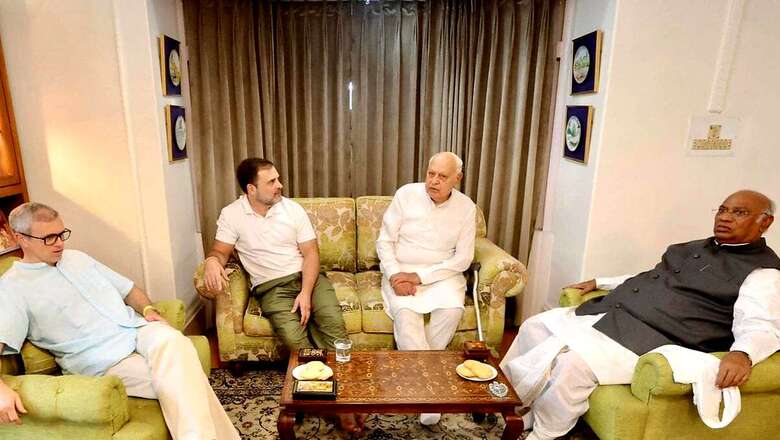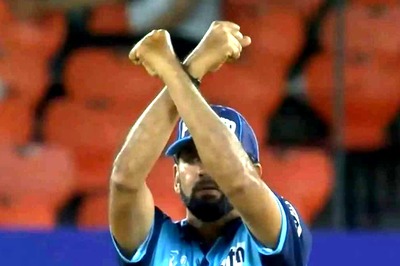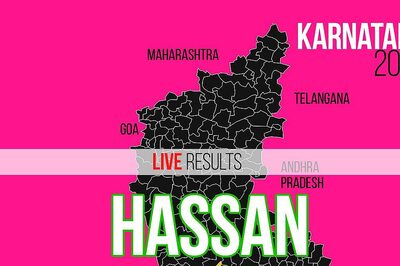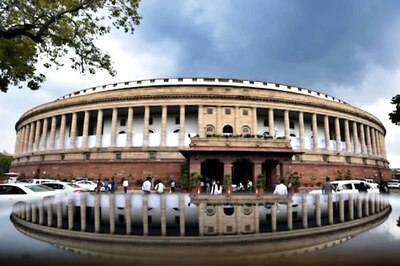
views
In an election rally in Anantnag on September 4, National Conference President and three-time chief minister Farooq Abdullah, thundered that to restore our dignity, the “hand” has to hold the “plough” today. ‘Hand’ is the election symbol of the Indian National Congress (INC) while ‘Plough’ is a registered party symbol of the National Conference (NC). This alliance is not new.
NC founder Sheikh Abdullah was blessed by India’s first Prime Minister, Jawaharlal Nehru, to head J&K’s emergency administration on October 30, 1947. Subsequently, the love-hate relationship between the INC and NC continued for several decades. The NC had a brief fling with the NDA during Atal Bihari Vajpayee’s government. Besides Farooq Abdullah, his father, Sheikh Abdullah, and his son, Omar Abdullah, ruled over Jammu & Kashmir. During those decades of NC and INC leadership, J&K was the only region in the country where discrimination was legalised and had become the norm. Neither the INC nor the NC addressed the issue of discrimination against a large section of the population.
Farooq Abdullah, however, claimed that his party was committed to saving the region from divisive forces attempting to drive a wedge between Hindus and Muslims. The facts, however, are the complete opposite. Those unaware of Kashmir’s history should read the legacy of the INC and NC to understand that J&K had the ‘hand’ and the ‘plough’ as divisive political forces since 1947, and ‘bhaichara’ for public consumption was merely a façade.
Sheikh Abdullah spoke against Hindus in the Kashmir Valley while vowing to die for them in Jammu. This double-speak was carefully crafted by Abdullah, who understood that discrimination was the master key to unlocking power, which he used liberally to accumulate political dividends and disempower certain groups in society. He unleashed spies to monitor the activities of Hindus. On November 9, 1951, the ASP of Intelligence, in his report to Sheikh Abdullah, noted that the Hindus of Jammu were raising their voices against the National Conference government. The report quoted a person named Des Raj, stating: “Indian money received here (J&K) was being expended in merry-making by the nominal masters of the so-called popular government. They were (in support) for the tri-colour flag and not for the plough flag. The National Conference was acting with motives other than sincerity, based on treachery and deceit.”
Interestingly, Sheikh Abdullah’s snooping on citizens was reportedly confined to Jammu. An intelligence report highlighted the pain and humiliation felt by the people. This clandestine report, which documented public reactions, stated: “They (the people) wanted the Indian Constitution to be enforced in the state. The state government has not been able to improve the condition of the masses. The government (Sheikh Abdullah’s), people said, ought to feel ashamed that the plough flag (the NC’s party symbol) had been soaked in their blood.”
Since the ‘hand’ is now “holding” the ‘plough’, as Farooq Abdullah observed, it is worth examining how this alliance harvested a crop of misery for generations. Union Home Minister Amit Shah offered a glimpse into this suffering on August 6, 2019. Speaking in Lok Sabha, he noted that the Indian government had allocated Rs 2.7 lakh crore to Jammu and Kashmir between 2004 and 2019. “But go and see the condition in the villages of Jammu—how much poverty is there. Where has all the money gone? The politicians there promoted corruption under the shelter of Article 370.”
He continued, “In 2011-12, the government, on average, gave Rs 3,683 per person in the rest of India, including J&K. But in J&K, Rs 14,255 per person was allocated, yet no development took place. In 2017-18, Rs 8,227 per person was allocated in the rest of India, while Rs 27,358 per person was allocated to Jammu & Kashmir. The state is being ruled by three families. They believe they should not be troubled, even if corruption flourishes there.”
Fifty-one years before Amit Shah’s speech, Atal Bihari Vajpayee had drawn the nation’s attention to the combined power of the ‘hand’ and ‘plough’, which ensured that the discriminatory and divisive Article 370 remained in force. On 30 August 1968, while exposing the sheer hypocrisy of the government, Vajpayee told the Lok Sabha that a soldier may sacrifice his life defending the people of Jammu & Kashmir, but his family cannot buy a piece of land and settle there. He remarked that it is ironical that the President of India, the first citizen of the country, cannot buy land in Jammu & Kashmir and settle there. Even the Parliament has no right to audit the money sent to Jammu & Kashmir, despite it coming from honest Indian taxpayers.
“Jammu & Kashmir is an integral part of our country. No one minds spending money on it. We have shed blood for J&K. We are toiling for its development. We are spending more money and will continue to do so. But who will check whether the money sent to J&K is being spent properly or not?” Vajpayee had questioned. He also revealed another startling fact in the Lok Sabha that day. He said that an officer who had helped Pakistani infiltrators in 1965 was promoted and later became a member of the assembly. At that time, the INC was ruling the state, and Ghulam Mohammed Sadiq was the Chief Minister.
“An IAS officer has been appointed who was an accused in the Kashmir conspiracy. There are some IAS officers who are not even graduates. I know at least two who are only matriculates,” Vajpayee had said.
Vajpayee indicated that there were no dreams in Jammu & Kashmir due to oppression. The ‘Hand’ and ‘Plough’ had ensured that people remained disempowered.
The real awakening happened in 2019 with the abrogation of the discriminatory Article 370. With aspirational governance from the Centre, people feel empowered, free from the ‘Hand’ and ‘Plough’, and are working towards a future better than the past. They are free to make decisions on how to work and live. Kashmiri society is finally raising a generation that is not insecure, vulnerable, or wary, but full of hopes and dreams.
Waseem Gul is Srinagar-based lawyer and columnist. He tweets @WG_Associates. Views expressed in the above piece are personal and solely that of the author. They do not necessarily reflect News18’s views.




















Comments
0 comment